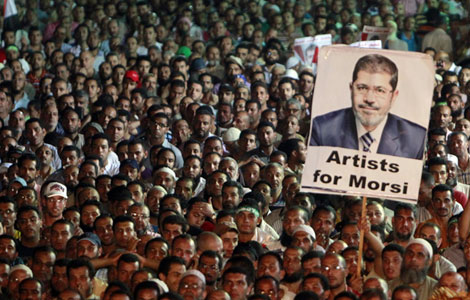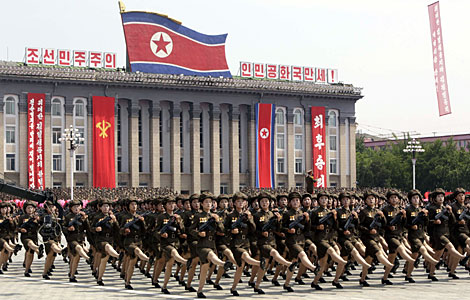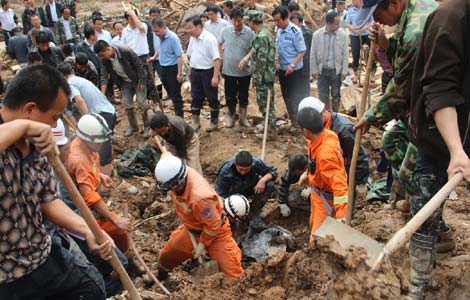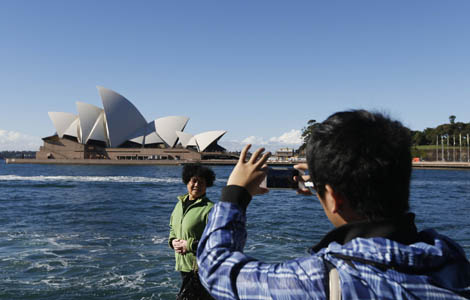
Sitting PM to maintain grip on power
The ruling party of Cambodian Prime Minister Hun Sen claimed victory in Sunday's elections, which were marred by allegations of widespread irregularities, but the party faced rare competition from a resurgent opposition.
Although official results had yet to be announced, Hun Sen's Cambodian People's Party said it expected to win 68 out of the 123 seats in the lower house.
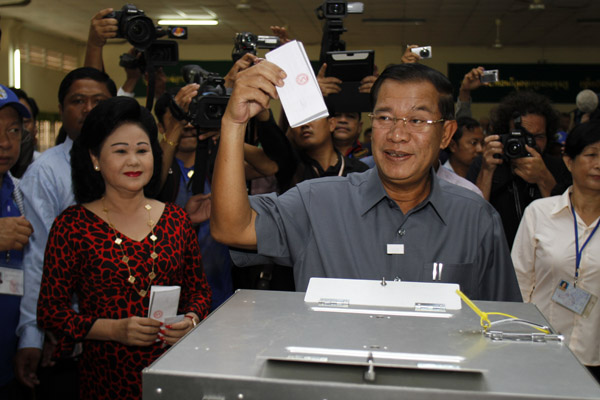 |
|
Cambodian Prime Minister Hun Sen raises a ballot at a polling station during the general election on Sunday. Hun Sen's ruling party claimed victory in parliamentary elections, saying it expected to win 68 out of the 123 seats in the lower house. Xinhua |
"We can say we've won this election," CPP spokesman Khieu Kanharith said.
The CPP had 90 seats in the previous Parliament, so if confirmed, the result would mark the loss of more than 20 seats.
Hun Sen, a former Khmer Rouge fighter, has been in power for 28 years.
The opposition decried what it described as the kingdom's worst-ever poll irregularities, including missing voter names and thousands of people who turned up to find that others had used their ballots.
"The situation is more serious than at any previous election," Cambodian National Rescue Party spokesman Yim Sovann said.
The party briefly created confusion after claiming it had won the polls, but it quickly retracted the statement. It had no immediate response to the ruling party's declaration.
Protests broke out at one polling station in the capital, Phnom Penh, where a crowd destroyed two police cars, military police spokesman Kheng Tito said, as anger erupted over names missing from the voter list.
Rights groups also expressed concern that the ink used to mark voters could be easily washed off.
"It is very difficult to proclaim this a free and fair election," said Kol Preap, executive director of Transparency International Cambodia.
"I think the level playing field in the process didn't really exist. There has not been equal access to the media, and the opposition leader was not allowed to run as a candidate."
The National Election Committee denied irregularities.
Even before polls opened, the opposition had said a Hun Sen win would be "worthless" without the participation of its leader, Sam Rainsy.
The French-educated former banker returned to Cambodia on July 19 from self-imposed exile after receiving a surprise royal pardon for criminal convictions that Rainsy contends were politically motivated.
But he was barred from running as a candidate since the authorities said it was too late to add his name to the electoral register.
Rainsy toured polling stations in Phnom Penh on Sunday to "collect more evidence" of vote irregularities.
He said that if indications pointed to a "plot to rig the election", then "definitely we will protest".
A local poll monitor, the Committee for Free and Fair Elections in Cambodia, alleged that up to 1.25 million people who were eligible to cast ballots were not on voter lists.
About 9.6 million people were registered to vote — more than a third of whom were under 30.
Soon after polls opened, a smiling Hun Sen kissed his ballot and dropped it into the box at a polling station at a teacher training school in the town of Ta Khmao near the capital.
First in line to vote there was 87-year-old Yim Hor Eam, who described it as a "historic day".
"I voted for peace for the country. If we make a wrong decision, the country will be in danger, will be destroyed," he said, without revealing whom he supported.
Hun Sen defected from the Khmer Rouge, and oversaw Cambodia's transformation from a nation devastated in the late 1970s to become one of Southeast Asia's most vibrant economies.
